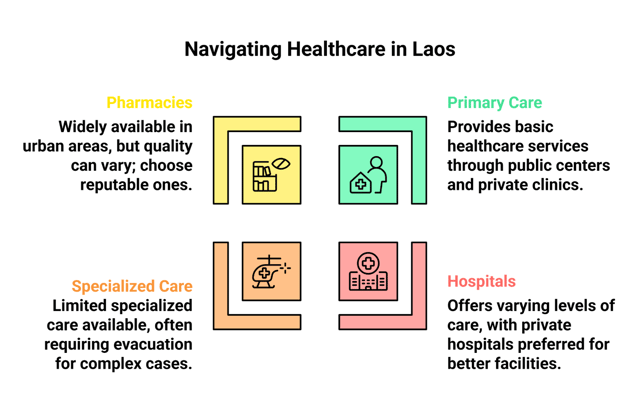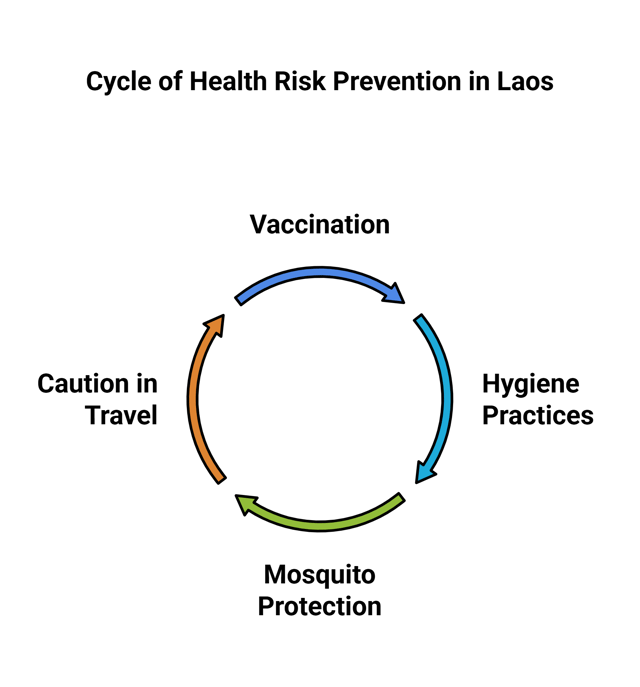
Laos, known for its lush landscapes and vibrant culture, is a rapidly developing nation. However, its healthcare system faces unique challenges due to limited infrastructure and resources. Whether you’re a resident, an expat, or a traveler, understanding the healthcare system in Laos is crucial for managing health and safety during your time in the country. When traveling to Laos for healthcare or leisure, ensure you have your Laos eVisa ready. It simplifies entry, allowing you to focus on exploring the country’s medical services and cultural offerings.
Overview of the Healthcare System in Laos
Laos operates a mixed healthcare system with public and private sectors. While healthcare services have improved in recent years, they remain underdeveloped compared to neighboring countries like Thailand or Vietnam. The majority of medical facilities are located in urban areas, leaving rural regions with limited access to quality care.
1. Public Healthcare
The public healthcare system in Laos is state-funded but heavily reliant on international aid and NGO support. Services are affordable but often lack the resources and personnel to provide high-quality care.
Challenges of public health care in Laos:
- Limited medical equipment and supplies.
- Shortage of skilled healthcare professionals, especially specialists.
- Long waiting times in public hospitals.
Cost: Public healthcare is relatively inexpensive, with basic consultations costing a few dollars.
2. Private Healthcare
Private healthcare facilities in Laos cater to wealthier locals, expats, and tourists. These facilities generally provide better care and shorter waiting times than public hospitals.
- Private Clinics and Hospitals:
- Located mainly in Vientiane and Luang Prabang.
- Offer general and specialist services, often staffed by foreign-trained doctors.
- More expensive than public hospitals but still affordable compared to Western standards.
- Cost:
- A consultation fee exists at a private clinic which usually differs.
- More complex treatments may require significant out-of-pocket expenses.
Medical Services in Laos
Medical services in Laos have been improving, but they can still vary in quality and availability depending on the location.

- Primary Care
Primary healthcare services are available through public health centers and private clinics. Public facilities, particularly in rural areas, often provide basic treatment for common illnesses.
Tip for Expats and Tourists: For minor health issues, private clinics in cities are recommended for better service quality.
- Hospitals in Laos
Most public hospitals are based in major cities like Vientiane, Luang Prabang, and Pakse. They can provide facilities for basic requirements and general treatments. However, they may not have advanced facilities or expertise to handle serious or complicated conditions.
- Private Hospitals:
Private hospitals represent better facilities and standards of care compared to the public ones, and include the French Medical Center in Vientiane and Mahosot Hospital. These are generally preferred by expatriates and those seeking reliable medical services.
- Specialized Care and Treatment:
Specialized medical care is limited in Laos, with the health sector not being prepared to take care of complex cases; thus, mostly, patients are evacuated to the neighboring countries for advanced treatment, such as Thailand, which has more developed healthcare systems.
- Private Hospitals:
- Pharmacies
Pharmacies are widely available in urban areas and carry a range of over-the-counter and prescription medications. However, the quality of drugs can vary, so it’s essential to choose reputable pharmacies.
- Tip: Always check expiration dates and avoid purchasing medication from informal markets.
Health Risks in Laos
Laos, while a beautiful country, presents some health risks for travelers. Here are a few key concerns:
- Infectious Diseases:Due to its tropical climate, Laos is prone to certain diseases.
- Malaria and Dengue Fever: Common in rural and forested areas, especially during the rainy season.Preventive measures include using insect repellents and sleeping under mosquito nets.
- Typhoid and Hepatitis A: Linked to contaminated food and water.
- Road Accidents:Traffic accidents are a leading cause of injury and death in Laos due to poor road conditions and limited traffic enforcement.
- Tip: Exercise caution when driving or using motorbikes, and always wear a helmet.
- Waterborne IllnessesDrinking untreated water or consuming uncooked food can lead to gastrointestinal infections.
- Tip: Stick to bottled or boiled water and avoid ice from unknown sources.

Prevention Tips of the health issues and diseases include:
- Vaccinations: Ensure you’re immunized against diseases like Hepatitis A, Typhoid, and Japanese Encephalitis.
- Hygiene: Drink bottled water, avoid raw or undercooked foods, and practice good hand hygiene.
- Mosquito Protection: Use insect repellents, wear long-sleeved clothing, and sleep under mosquito nets.
Health Insurance in Laos
Having health insurance is essential for expats and travelers in Laos due to the limited healthcare system and high costs of evacuation or specialized care.
1. Travel Insurance
- Recommended for: Short-term visitors.
- Covers medical emergencies, evacuation, and repatriation.
2. International Health Insurance
- Recommended for: Expats and long-term residents.
- Offers comprehensive coverage, including access to private hospitals and evacuation services.
3. Lao Social Health Insurance (SHI)
- Available for Lao citizens and some expatriate workers through their employers.
- Provides limited coverage and is not sufficient for serious medical issues.
Medical Evacuation from Laos
For serious medical conditions, evacuation to Thailand or another neighboring country is often necessary.
- Common Destinations: Bangkok, which has world-class hospitals like Bumrungrad International. Chiang Mai for medical care closer to the Lao border.
- Cost: Ensure your insurance policy covers medical evacuation.
Cultural Beliefs and Healthcare in Laos
Cultural beliefs strongly influence how people in Laos view health and seek treatment. Many rely on traditional medicine, such as herbal remedies, massage, and spiritual healing, believing illnesses may result from spiritual imbalances or karma.
Family and community play a key role in healthcare decisions. Advice from elders or traditional healers is often preferred, especially in rural areas, where modern medical services may not be easily accessible. Mental health issues are often misunderstood, with stigma preventing many from seeking help.
Efforts are being made to combine traditional practices with modern medicine, helping communities access better healthcare while respecting their beliefs. This approach builds trust and improves overall health outcomes.
Tips for Staying Healthy in Laos
Here are some key tips to help travelers prioritize their health while exploring Laos for a unique experience:
- Vaccinations: Recommended vaccines include hepatitis A and B, typhoid, rabies, and Japanese encephalitis. Ensure routine vaccines (e.g., measles, tetanus) are up to date.
- Drink Safe Water: Avoid tap water and use bottled or boiled water.
- Prevent Mosquito Bites: Use insect repellent with DEET and sleep under treated mosquito nets.
- Practice Road Safety: Wear helmets and avoid night driving.
- Travel Insurance: Always travel with comprehensive insurance that covers medical emergencies and evacuation.
Content Disclaimer: While this information was last updated in January 2026, we strongly suggest confirming all travel details with the appropriate governmental agencies, embassies, and airlines.